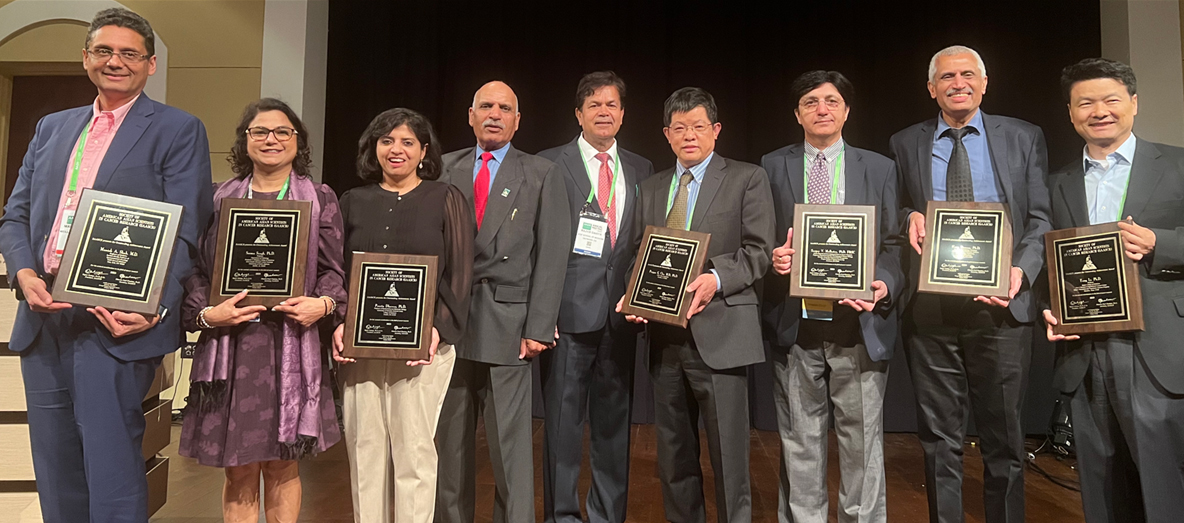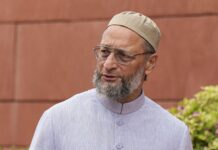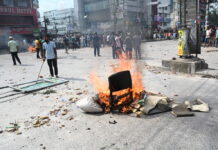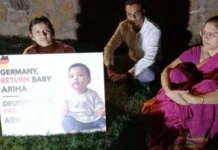India Post News Service
Seven Indian-American scientists were honored for their seminal contributions in cancer research by the Society of American Asian Scientists in Cancer Research (SAASCR) on April 16th 2023 at Orlando, Florida during American Association for Cancer Research (AACR) annual meeting, April 15-19, 2023.
Pictured (left to right)Dr. Manish Shah, Dr. Seema Singh, Dr. Punita Dhawan, Dr. Dharam Pal Chauhan (Secretary SAASCR), Dr. Rajvir Dahiya (President SAASRC); Dr. PeiguoChu; Dr. Sanjay Malhotra; Dr. Venu Raman; Dr. Yong Li.
The Society of American Asian Scientists in Cancer Research is a non-profit, non-political organization registered in the state of California in 2004 and has more than 5,000 members. All our members are also members of American Association for Cancer Research (AACR). SAASCR scientists are from Asia, mainly of Indian origin, and working in the U.S. and Canada in the field of cancer research and fully sponsored by the biotechnology company.
Dr. Rajvir Dahiya, the president of SAASCR, presented awards to these scientists on April 16th 2023 in Orlando, Florida during American Association for Cancer Research Annual Meeting. Dr. Rajvir Dahiya is a Professor Emeritus at the University of California San Francisco (UCSF) School of Medicine. Dr. Dharam Pal Chauhan is a secretary of SAASCR and is a retired Professor from University of California San Diego (UCSD) School of Medicine.
Manish A. Shah, MD, FASCO, is Professor of Medicine at Weill Medical College of Cornell University, the Bartlett Family Professor for Gastrointestinal Malignancies, Chief of the Solid Tumor Service, and Director of the Gastrointestinal Oncology Program in the Division of Hematology and Medical Oncology. Dr. Shah is current chair-elect for the ASCO Clinical Delivery Council, previous chair of the ASCO Clinical Practice Guideline Committee, prior member of the Guidelines Methods Committee, and prior committee member for the ASCO Education Committee – Upper Gastrointestinal Subcommittee. His career is focused on improving the care of patients with gastrointestinal malignancies, both through improving care delivery, drug development, and better defining disease subtypes.
He received his B.S. in Biomedical Engineering from Johns Hopkins University and later earned an M.D. and M.S. from Harvard University and the Massachusetts Institute of Technology through the Harvard-MIT Health Sciences and Technology program. Dr. Shah’s research focuses on understanding gastrointestinal cancer disease biology and in the development of novel therapeutics for gastrointestinal malignancies. He leads an active research group for overcoming resistance to cytotoxic therapy and has had several trainees that have gone on to successfully continue in academic oncology. Dr. Shah is an active educator and mentor for house staff, hematology and medical oncology fellows, and junior faculty, and clinical researcher. He serves on several advisory boards in GI malignancies, and is the Char of the Scientific Advisory Board for the DeGregorio Family foundation for Gastrointestinal Malignancies. He has over 150 peer reviewed publications, and authored several chapters and books focused on Medical Oncology and in improving the care of patients with Gastrointestinal Cancers, and is sought after worldwide for his insights on drug development in Gastrointestinal Malignancies.
Seema Singh, Ph.D., is a distinguished Pathology Professor and senior member of the Cancer Biology and Cancer Health Disparities Program at the Mitchell Cancer Institute, University of South Alabama. Dr. Singh embarked on her independent research career in 2009, following postdoctoral training at the University of Nebraska Medical Center. Her research endeavors have primarily centered on inflammation and host-tumor interactions. Her research focus expanded to include cancer health disparities, owing to the diverse racial composition of the population in the gulf coast region (encompassing Southern Alabama, Southeast Mississippi, and Southwest Florida). Dr. Singh’s laboratory has identified race-specific biological disparities in women with or without a cancer diagnosis that could serve as predictive risk factors for cancer, early-onset cancer, aggressive phenotypes, and poor treatment outcomes. Her outstanding contributions to the field are evidenced by the publication of over 100 peer-reviewed articles in high-impact journals and several book chapters. Dr. Singh also serves on the Editorial Board of several journals and regularly participates in manuscript and grant-reviewing activities. She is actively involved in numerous outreach and fundraising initiatives to raise cancer awareness and support cancer research. Furthermore, she is a member of the Medical Advisory Council of the Breast Cancer Research Foundation of Alabama. Dr. Singh recently completed her MBA from the Mitchell Business School at the University of South Alabama.
Punita Dhawan, Ph.D. is Professor in the Department of Biochemistry and Molecular Biology, University of Nebraska Medical Center, Omaha Nebraska. She is an expert in Gastrointestinal research. She is known at national and international level for her research and considered a leader in the field of Colon Cancer research.
Dhawan received her Ph.D from University of Arkansas for Medical Science, Little Rock, Arkansas. She received her training in Cancer biology at Vanderbilt University, Nashville TN. She joined UNMC as an Associate Professor in 2014 and is currently a tenured Professor.
Dhawan’s laboratory is continuously funded by federal (NIH and VA) as well as State and Private agencies. Her lab program is largely focused on identifying novel therapeutic targets, understanding associated mechanism/s and developing pharmacological agents to treat Cancer Metastasis and Chemoresistance.
Peiguo Chu, M.D., Ph.D. is Founder, CEO and Pathologist at Neogenomics Laboratories at Allison Viejo, California. Earlier, he was a Professor of Pathology at the City of Hope National Medical Center, Duarte, California. Dr. Chu did his internship from the University of Pennsylvania School of Medicine, residency and fellowship from Yale University School of Medicine in surgical pathology. He has published more than 160 original research articles in peer reviewed journals. His laboratory was funded through various NIH ROI, UO1, and P30 projects. He has developed various biomarkers for diagnosis and prognosis of various cancers.
Sanjay Malhotra, Ph.D., FRSC is a Professor & Endowed Chair in Cancer Research in the Department of Cell Development and Cancer Biology and also Director, Center for Experimental Therapeutics at the Knight Cancer Institute, OHSU. Before joining OHSU in July 2020, he was a faculty member in the departments of Radiation Oncology (Cancer and Radiation Biology), Radiology (Molecular Imaging Program) and Medicine, at the Stanford University School of Medicine. Dr. Malhotra also served as the Director, Stanford-SRI Drug Discovery and Development Program of the Stanford Cancer Institute. Previously, Dr. Malhotra was ‘Principal Investigator and Head’ of the ‘Small Molecule Drug Discovery Laboratory’ at the National Cancer Institute (NCI), NIH. He is a founding member of the NCI’s national drug discovery program, Chemical Biology Consortium (CBC), and served as the Director, Chemical Diversity Division of CBC/NCI.
During President Barak Obama’s tenure, he served as a member, Office of Science & Technology Policy (OSTP) White House, Committee for Indio-US Joint Commission Meeting (JCM) in Science & Technology, Washington, DC, and helped draft policy for bi-national efforts in science and technology. In 2020 he was invited as an Advisor & Panelist to Prime Minister of India’s VAIBHAV Summit on ‘Drug discovery, repurposing and drug delivery’. He has over 25 years of experience in basic and translational research. His interests focus on the design and discovery of synthetic and natural product inspired small molecules as probes to understand biological phenomena, and translational research in drug discovery, development, imaging and radiation. Dr. Malhotra’s work has led to preclinical and clinical advancement of several molecules. He has edited five books and authored 150 research articles in peer reviewed journals. Dr. Malhotra is a Fulbright Specialist and Fellow of the Royal Society of Chemistry, UK.
Venu Raman, Ph.D. is a Professor in the departments of Radiology, Oncology, Pharmacology and Molecular Sciences and is the Director of Molecular Therapeutics, Division of Cancer Imaging at Johns Hopkins University School of Medicine. Also, he holds an adjunct faculty position at the Department of Pathology, University Medical Centre Utrecht, The Netherlands.
Dr. Raman completed his B.Sc. in Microbiology from University of Bombay and his M.Sc. in Microbiology from M.S University, Baroda. Subsequently, he received a Commonwealth scholarship in Australia, where he did his Ph.D. in gene regulatory systems in Developmental Biology from CSIRO/University of New South Wales, Sydney, Australia. Following post-doctoral training in developmental biology at Indian University, as a faculty of Johns Hopkins University School of Medicine, he continued his research interest in understanding the role of deregulated genes in cancer biogenesis. His interest in cancer biogenesis led to the design and synthesis of a first-in-class drug to treat multiple cancers. Dr. Raman and his team are currently focused to develop this drug for clinical trials in cancer patients with unmet needs. His translation research program is centered on identifying novel druggable targets that will have an impact on curtailing cancer and improving the quality of life for the patients.
Yong Li, Ph.D. is a Professor of Medicine and CPRIT Scholar in Cancer Research in the Department of Medicine at Baylor College of Medicine with interests in environmental carcinogenesis, genetic polymorphism, artificial intelligence, monoclonal antibodies, and tumor antigens. His major contribution in cancer research is to understand mechanistic processes influencing gene expression, microRNA pathobiology, exposure to environmental toxicants and their interactive effects with genetic and epigenetic factors on cancer development. His recent work develops novel strategies for understanding the intersection between tumor antigen expression and tumor-infiltrating B cells and plasma cells. Dr. Li did postdoctoral research fellowship at Yale University School of Medicine.
Contact information about the awardees.
- Dr. Manish A. Shah, M.D.
- Professor of Medicine
- Weill Medical College
- Cornell University New York, NY 10021
- Email: mas9313@med.cornell.edu
- Dr. Seema Singh, Ph.D.
- Professor of Pathology
- Department of Pathology
- Mitchell Cancer Institute
- University of South Alabama
- Mobile, AL 36604
- Email:seemasingh@southalabama.edu
- Dr. Punita Dhawan, Ph.D.
- Professor of Biochemistry and Molecular Biology
- University of Nebraska Medical Center,
- College of Medicine
- Omaha, NE 68198
- Email:Punita.dhawan@unmc.edu
- Dr. Peiguo G. Chu, M.D., Ph.D.
- CEO, Zeta Corporation
- Arcadia, CA 91006
- Email:jerry@zeta-corp.com
- Dr. Sanjay V. Malhotra, PhD, FRSC
- Professor, Sheila Edwards-Lienhart Endowed Chair
- Department of Cell Developmental & Cancer Biology,
- Oregon Health Science University (OHSU)
- Portland, OR 97239
- Email: malhotsa@ohsu.edu
- Dr. Venu Raman, Ph.D.
- Professor of Radiology,
- Pharmacology and Molecular Sciences,
- Johns Hopkins University,
- School of Medicine,
- Baltimore, MD 21205
- Email:vraman2@jhmi.edu
- Dr. Yong Li, Ph.D.
- Professor of Medicine
- Baylor College of Medicine
- Dan L Duncan Comprehensive Cancer Center
- Cancer Prevention and Population Sciences Program
- Houston, Texas 77030
- Email:yong.li@bcm.edu







